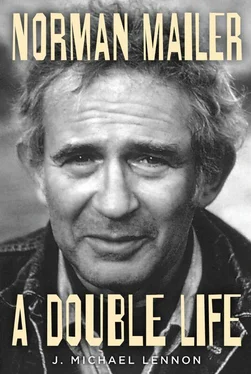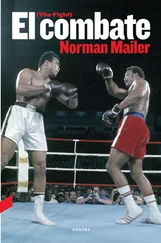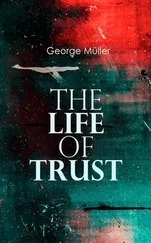Mailer seldom wrote about his childhood. In 2004, he said that he had avoided writing about Long Branch and Brooklyn because “too many crystals are there” and “you don’t want to write about the material…. Preserve it because it’s endlessly fruitful.” Crystals, as he explained several times, are memories of wrenching or exhilarating experiences, epiphanies in one’s past that, properly considered, are illuminating. When a crystal is aligned just so, it casts an imaginative beam that clarifies a new experience, acting as a kind of emotional spectrometer. We can only speculate on his childhood crystals, but given the instances of childhood fear and timidity already noted, it seems quite possible that he was referring to moments of ignominious humiliation. Late in life, he said, “I don’t feel joy going back to the old streets in Brooklyn.”
Mailer was an outstanding student at Boys High, graduating near the top of his 650-member class. His grades were nearly as high as those of valedictorian Martin Lubin, a boy he knew slightly and later roomed with at Harvard. But Mailer’s lack of involvement in athletics and student government — indeed, his lack of involvement in any school activity except for the aviation club — left him out of the running for valedictorian. Overall, his best grades were in math and science (a 99.5 in Algebra and a 99 in Chemistry), but his English, French, and History grades were only a few points lower. His lowest academic grade was in drawing, an 80; his grades in physical training were dismal. Beatrice Silverman, his first wife, said he had trouble vaulting over the horse in gym class. His report cards gained plaudits at home, especially the math and science grades, but not in the neighborhood, where he was just another skinny kid. “In Brooklyn I was always a little ashamed of being smart,” he said. “Somehow you weren’t manly if you were smart.” He did have some success with the opposite sex, however. Barbara’s friend Rhoda Wolf had a crush on him and his girlfriend, Phyllis Bradman, according to his sister, was the prettiest girl in the neighborhood, although they never got beyond kissing and light petting. The summer before he died, he remembered his situation.
I was 13; it was 1936. The New Deal was on; a great deal was happening. But we, in Brooklyn, in my end of Brooklyn, weren’t thinking about anything but sex. We wanted to get laid. We wanted to muzzle a girl as they called it, and put our hands on their breasts. We wanted to be able to neck with them. And none of us were. The girls were nice Jewish girls who were loath and we were inhibited — the Jews were very inhibited about sex…. And I remember that in all those years of adolescence, I was absolutely focused on girls and pornography. There used to be little magazines like Spicy Detective in those days, where the women had huge tits poking through gossamer scraps of torn blouse. And that was a huge turn-on.
One scheme dreamed up by Mailer and two other boys, Arnold Epstein and another friend, Harold Kiesel, was to form a musical trio and get a summer job at a Catskills resort where they might seduce some Jewish women. He convinced his parents to buy him a clarinet; Kiesel played the trumpet and Epstein the drums. On afternoons after school, they practiced at the apartment of Epstein, who remembered their sessions: “I could keep beat with anything. But Kiesel and Norman had to get tunes out of their instruments, and I think they were equally bad. We’d laugh and giggle and fall on the floor.” The project soon collapsed. Mailer never learned to play an instrument and had trouble carrying a tune. He remembered going to a few dances in high school, but was “a wallflower… a terrible dancer, very stiff-legged.” At the Scarboro Hotel one summer there was a flirtation with a pretty girl named Bunny Schwab, but nothing sexual came of it. Decades later, he still vividly remembered his humiliation when Bunny described his large, sunburned ears as “red sails in the sunset.”
“High school’s that place, that country,” he reflected later, “where you get laid for the first time; you have marvelous memories and you go around with a girl, you go to the prom.” But for him high school was studying and he was bitter because his social life was so dull. People who knew him in high school, he said, thought he was “quiet, studious and inconsequential.” His work paid off, however. His grades got him accepted to both MIT and Harvard. He knew that he was more likely to realize his dream of becoming an aeronautical engineer at MIT, as it had a program in this specialty, something Harvard lacked. But because of his age, MIT wanted him to go to prep school for a year. This circumstance led him to Harvard. What clinched it, he often said, was the reaction of girls on Crown Street. MIT’s name didn’t impress them, but “when I said I might go to Harvard, they lit up and they saw me with new eyes.” Choosing Harvard, for reasons he could not have guessed at the time, was one of the luckiest things he ever did.
The distinguished historian and journalist Theodore H. White, who graduated from Harvard in 1938, came up with a system of classifying prewar Harvard students. They were divided, he wrote, into three groups, “white men, gray men, and meatballs.” The first group was comprised of wealthy WASPs from New England who graduated from private prep schools. The gray men were middle-class boys from public schools, mainly outside New England. The meatballs were non-WASP students who commuted and/or were on scholarship. White, a Jew whose father was born in Russia, claimed meatball status. He didn’t attend Harvard “to enjoy the games, the girls, the burlesque shows of the Old Howard, the companionship, the elms, the turning leaves of fall, the grassy banks of the Charles.” He was there to gobble up cultural riches from learned professors, from the libraries, museums, poetry readings, tutorials — all of this under a dome of reverence for intellectual and scholarly pursuits. Mailer and his friend Marty Lubin, both of whom received scholarships (sophomore year for Mailer), were classic meatballs, although such was the subtlety of condescension at Harvard that they probably never heard the term. Mailer was also there for the culture, although it took him the better part of a year to find it. Unlike White, he was profoundly interested in girls, although the kind he sought were as difficult to find as were the right professors.
He was assigned to Grays Hall, a five-story freshman dorm on Massachusetts Avenue accommodating about sixty men. They lived in comparative luxury in two- or three-person suites, cleaned by “biddies,” with a shared bathroom and a working fireplace. Like the Oxbridge house system that it mimicked, Harvard’s houses and halls had a master living on the first floor who regularly invited students for tea and dinner. The administration more or less randomly assigned the approximately eight hundred resident members of his class (about a hundred more commuted) to approximately fifteen freshman dorms. Most nationalities, states, and several foreign countries were represented in the class. WASPs, German-Americans, and Irish-Americans dominated, although more than 10 percent of the class was Jewish. Mailer shared his second-floor suite with Richard Weinberg from Memphis and Maxwell Kaufer from Kingston, Pennsylvania. Looking back, he said that he noticed no discrimination. Harvard, he said, “had solved more delicate social situations than any other institution… of the establishment.” He estimated that during his first year four out of five of his friends were middle-class Jews and they socialized in the same way black students would a generation later. In his second semester, he would become friendly with several non-Jewish men, most of whom he later associated with on the college literary magazine, the Advocate , or the Signet Society, an intellectual luncheon club. But for his first semester, his group included three other Grays men, Seymour Breslow, Myron Kaufmann, and Stanley Lampert. Marty Lubin, Harold Katz, Douglas Woolf, Peter Ruderman, and Harold Marantz, who lived in other dorms, made it nine. All Jews, all meatballs.
Читать дальше












